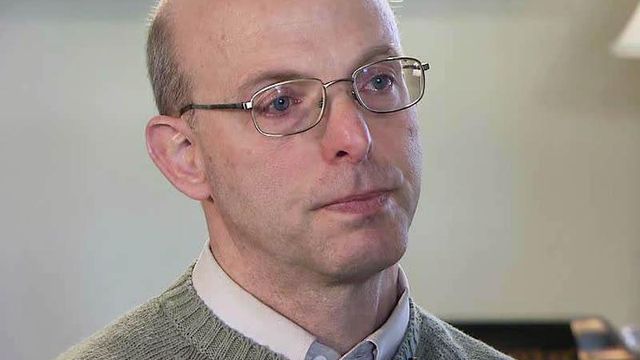Blood experts not allowed to remark on Peterson's guilt
A judge on Friday blocked a prosecutor's attempt to have blood evidence experts discuss whether Mike Peterson was guilty of killing his wife, regardless of the testimony presented by a blood analyst at Peterson's 2003 trial.
Posted — UpdatedPeterson, a Durham novelist and one-time mayoral candidate, is seeking a new trial, arguing that former State Bureau of Investigation analyst Duane Deaver provided misleading testimony about blood evidence during his trial.
Peterson was convicted of first-degree murder in the Dec. 9, 2001, beating death of his wife. Kathleen Peterson was found dead in a pool of blood at the bottom of a staircase in the couple's upscale Durham home.
Defense attorney David Rudolf has spent this week trying to discredit Deaver, whom the SBI fired in January. An agency official said he was known to be biased in favor of prosecutors, and two blood evidence experts said the tests he conducted in the Peterson case were flawed.
Durham County District Attorney Tracey Cline planned to bring in other blood evidence experts who were hired by the state eight years ago but never testified at Peterson's trial. They believe Peterson is guilty of murder, she said, which backs up Deaver's findings.
Rudolf objected to the move, saying their opinion about the verdict is irrelevant. Witnesses should be allowed only to review Deaver's tests and results, he said, not bring in new evidence as to whether the jury was right.
"The issue here is," Rudolf argued, "did Duane Deaver mislead the court first of all, so that the court qualified him as an expert and allowed him to give the opinions that he gave based on those tests, and No. 2, did he mislead the jury?”
Superior Court Judge Orlando Hudson agreed with Rudolf, cutting off what appeared to be Cline's main line of defense against a new trial.
Earlier Friday, a retired FBI agent who reviewed the state crime lab's policies and procedures said that Deaver often left details out of his reports so as not to confuse prosecutors and defense attorneys.
Chris Swecker's analysis of the State Bureau of Investigation lab last year found that that blood evidence was misstated or falsely reported in about 200 criminal cases between 1987 and 2003. Some of the most egregious cases cited in the review were linked to Deaver.
Swecker said the crime lab didn't have a policy on how to report tests on blood evidence until 1997. Even after that, the policy wasn't really clear about what to report when, he said.
Deaver said during the six-month review that he wrote his reports so they would be easily understood by investigators and prosecutors, Swecker testified. He said that he didn't include the results of any negative follow-up tests in his reports because he feared that would confuse people and make them think no blood was present.
Still, Swecker said, he doesn't believe Deaver or other SBI analysts tried to mislead anyone in their reports.
"I did not believe that any analysts deliberately withheld reporting results,” he said.
Two other SBI analysts who reviewed Deaver's work in a separate case testified that he didn't like to be questioned about his findings.
Agents Kristin Hughes and Russell Holley were asked to retest evidence when Greg Taylor's case came before the North Carolina Innocence Inquiry Commission in 2009. Taylor spent 17 years in prison for a Raleigh murder before a specially appointed judicial panel declared him innocent last year and released him.
Deaver didn't testify at Taylor's 1991 trial, but his follow-up tests on evidence that were negative for the presence of blood were never included in his report and turned over to defense attorneys. The case prompted Attorney General Roy Cooper to ask Swecker to conduct the outside review of the crime lab.
Hughes and Holley both said Deaver had a surly attitude about Taylor's case going before the Innocence Commission, and he was adamant that Taylor was guilty.
"He did it. He is where he needs to be," Hughes recalled Deaver saying during a meeting to review the evidence.
Holley said he tested a fender off of Taylor's car and couldn't find any blood where Deaver said 15 years earlier that there was blood. He said Friday that there are some innocent explanations for the different results, but when he brought the issue up with Deaver two years ago, he also got an earful about Taylor's guilt.
"He looked frustrated. He didn't seem happy to be there," Holley said, adding that the whole meeting left him feeling uncomfortable.
• Credits
Copyright 2024 by Capitol Broadcasting Company. All rights reserved. This material may not be published, broadcast, rewritten or redistributed.






